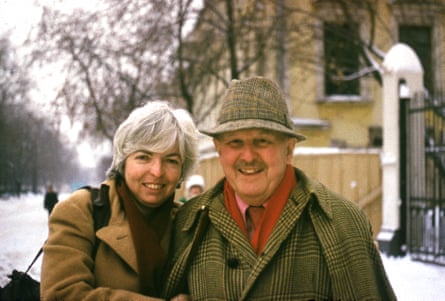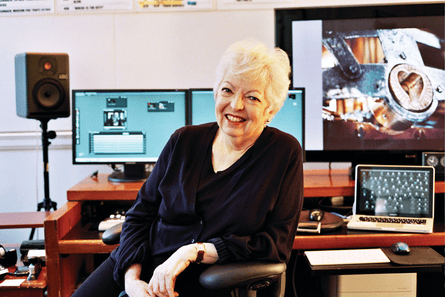At the age of 15, Thelma Schoonmaker saw The Life and Death of Colonel Blimp, a well-known war movie made by British filmmakers Michael Powell and Emeric Pressburger, after finishing school for the day.
“It was a coincidence that it was on, but I never forgot about it. It stayed in my mind,” she says nostalgically, nearly seven decades later. “I had no clue that it was created by the man I would eventually marry.”
Schoonmaker is considered by many to be the most accomplished film editor in the world. She has worked alongside Martin Scorsese for over 50 years and is responsible for the behind-the-scenes magic in some of the most popular movies of recent times, including Goodfellas, Casino, The Departed, Wolf of Wall Street, and the highly-rated Killers of the Flower Moon.
Because of the strike by actors, Schoonmaker and Scorsese were responsible for a large portion of the publicity for their newest movie. However, the reason for Schoonmaker’s promotional trip to the UK was the British Film Institute’s 12-week tribute to the films of Powell and Pressburger – known as the “Archers” – who created 24 films from 1939 to 1972, including A Matter of Life and Death and The Red Shoes.
Schoonmaker married Powell in 1984. Since his death in 1990, she, along with Scorsese, have been longstanding proselytisers of his films, working to restore eight of them with money raised by Scorcese’s Film Foundation.
The 83-year-old shares that her time with Michael was the happiest in her life. After his passing, she felt a constant fire burning within her. By promoting her late husband’s films, she finds some solace in her grief. Her focus on his career rather than her own showcases her humility, despite her own impressive accomplishments.
Schoonmaker has been nominated for eight Academy Awards for her outstanding work in film editing, and has won three of them. This makes her the first woman to win multiple Oscars in this category. She also holds the record for the most wins in the editing category. In addition to her Oscar wins, she has received two BAFTAs, four ACE Eddie awards, and has been recognized with the BFI Fellowship, the Golden Lion for Lifetime Achievement, and the BAFTA Fellowship.

Her journey towards becoming a filmmaker was not a straightforward path. Growing up mainly on the Dutch-Caribbean island of Aruba (where her father worked for an oil company and traveled frequently), she relocated to the United States as a teenager and found it to be unfamiliar. Her initial career goal was to become a diplomat, but her outspoken opposition to South African apartheid led to her rejection from the state department for being “too politically liberal”. She recalls, “They told me I wouldn’t fit in here.”
At the age of 23, she met Scorsese by chance while attending a summer course at Washington Square College, now known as NYU. She had decided to pursue a career in film-making. He was 21 at the time. From then on, Scorsese trusted her to edit his films and began teaching her about the editing process, despite her lack of prior knowledge. She went on to edit his first feature film, Who’s That Knocking at My Door in 1967, as well as Raging Bull in 1980 and all of his subsequent films.
She attributes her “growth as an artist” to Scorsese and also acknowledges him for “teaching” her about the works of Powell and Pressburger. Later, at a dinner in New York, Scorsese introduced her to Powell. She was already a fan, but meeting him in person only heightened her admiration. Their relationship gradually turned into a romantic one, much to the surprise of those around them. She recounts this with a playful and flirtatious tone.
Powell faced challenges when the film industry turned against him, particularly after the release of his controversial movie Peeping Tom in 1960. According to her, he was largely forgotten until Scorsese helped bring attention back to his work. She credits Scorsese as the biggest advocate for Powell and Pressburger.
Although it may seem unlikely, the films of a British man from Kent and an Italian-American from Little Italy share many commonalities. Robert Helpmann’s eyes in The Tales of Hoffmann influenced Robert De Niro’s gaze in Taxi Driver, while the championship fight buildup in Raging Bull was inspired by the duel scene in The Life and Death of Colonel Blimp. According to Scorsese, there is no clear hero or villain in Michael Powell’s films, but rather a focus on the complexities of human nature, which also interests him. In fact, Scorsese has even stated that The Red Shoes is a constant source of inspiration for him and is always on his mind.
The Red Shoes, a film about a young woman (portrayed by prima ballerina Moira Shearer) aspiring to be a top dancer, is being shown in theaters again on Friday in honor of its 75th anniversary. As part of an exhibition at the BFI Southbank until January 7th, Scorsese has lent a pair of shoes featured in the film.
Schoonmaker is deeply moved by the mutual support between the two most important men in her life. During Powell’s illness, Scorsese halted the editing of Goodfellas to allow Schoonmaker to bring him back to England. His passing two months later left her devastated. “Goodfellas gave me a reason to live. I didn’t want to continue, but I knew Michael would have wanted me to finish it.” It is unfortunate that Powell did not live to see the completed film, despite encouraging Scorsese to persist despite numerous rejections from studios who were against including drugs in the story.
Unfortunately for those who criticize others, Goodfellas solidified Scorsese’s standing as one of the greatest directors in the world. Schoonmaker expresses that working with him has been an incredible experience, stating that every film presents a unique challenge. From Wolf of Wall Street to Silence to Killers of the Flower Moon, each movie is vastly different. They both edit every film together and part of Scorsese’s brilliance is his ability to think like an editor.

The film Killers of the Flower Moon has achieved the top spot in Sight and Sound’s yearly poll, which is determined by approximately 100 renowned film critics. Editor Thelma Schoonmaker expressed her hope that the film, which delves into the heinous crimes committed against the Native American Osage Nation, will shed light on a neglected period in American history. When asked if the film’s lengthy duration of 206 minutes was taken into account, she simply stated that working with the Osage Nation has deeply enriched her life and believes it will have a similar impact on viewers. She has previously spoken out against the mandatory intermission added during the film’s screenings, calling it a violation.
Schoonmaker is particularly talkative when talking about the past contributions of women in the film industry. Despite facing discrimination in the 1960s and 70s, she acknowledges the significant work done by prominent female editors during that era. Names such as Dede Allen, Margaret Booth, and Verna Fields are mentioned, although the industry has drastically changed since then. Schoonmaker notes that the current presence and impact of women in film is truly impressive.
There have been other changes as well. In recent times, while promoting the works of Powell and Pressburger, Schoonmaker has been pleasantly surprised by the large presence of young individuals at showings of these timeless films. “Even Greta Gerwig has acknowledged that A Matter of Life and Death and Red Shoes greatly influenced Barbie! It’s truly heartening to see that the younger generation has reconnected with Michael’s cinematic masterpieces.”
Source: theguardian.com

















